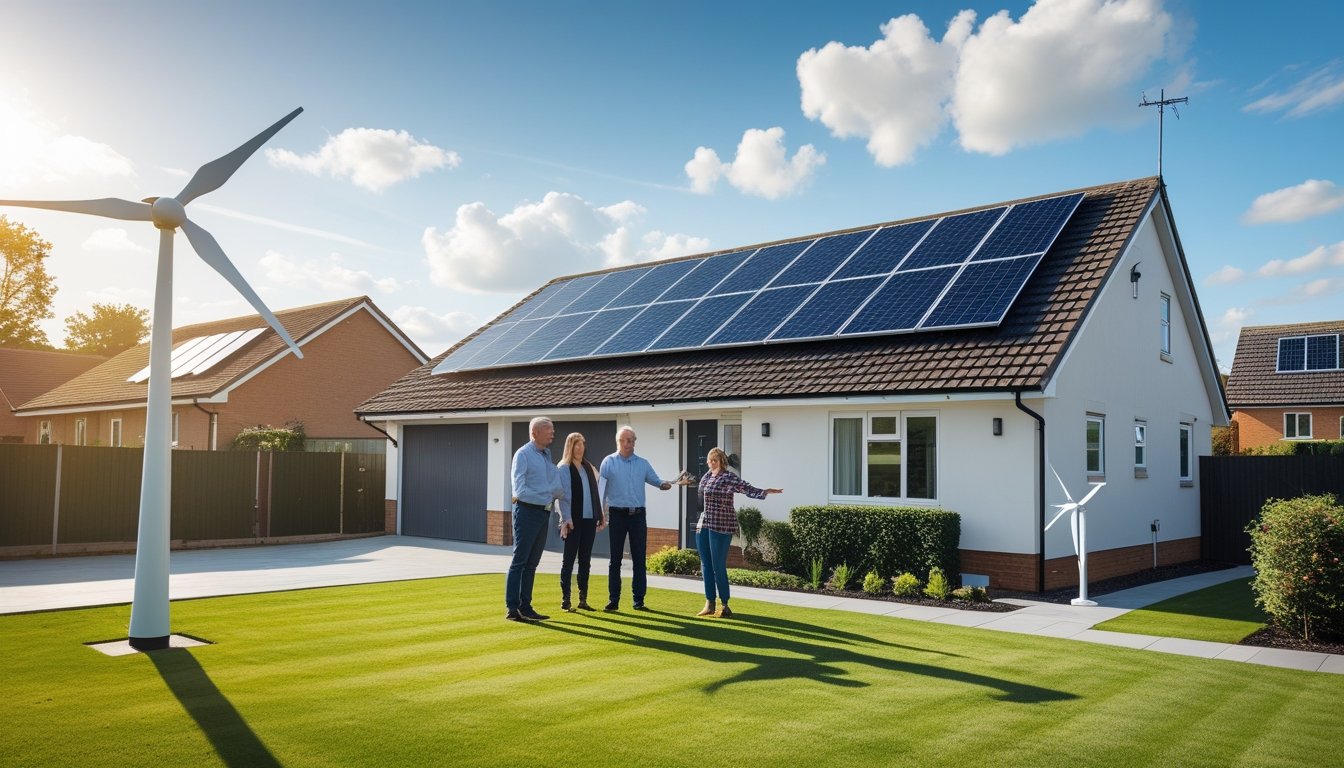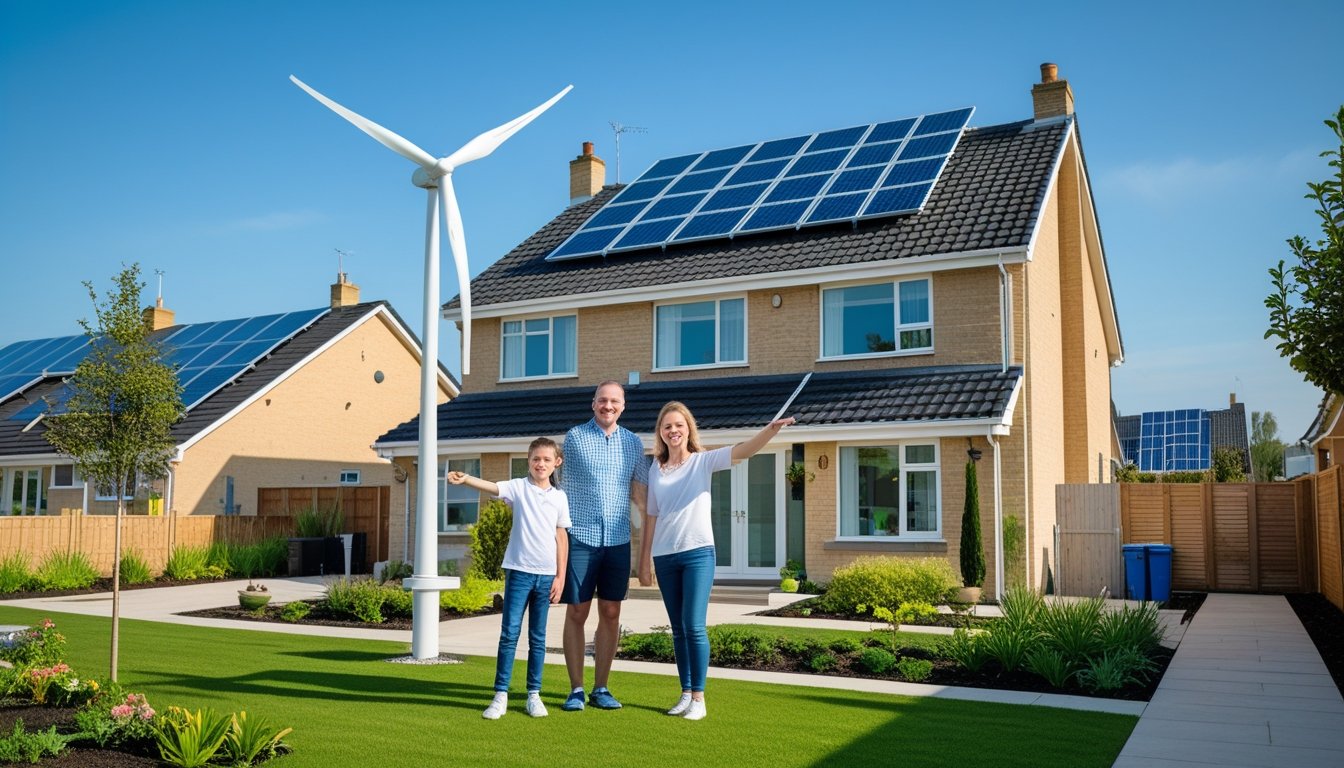Late updated: 23 Aug 2025 14:08
Written by: Eleanor Hartman
Renewable Energy Myths Busted for UK Homeowners: Dispelling Common Misconceptions
In the UK, renewable energy is often overshadowed by a cloud of misconceptions, leaving many homeowners unsure about its true benefits and feasibility. As we navigate the energy landscape, it's essential to separate fact from fiction to make informed decisions. Contrary to popular belief, renewable energy sources like solar and wind power are now more affordable and reliable than ever before.

Misunderstandings about the cost, efficiency, and practicality of renewable energy can deter homeowners from embracing these sustainable solutions. It’s crucial for UK homeowners to dispel these myths, as doing so opens the door to cleaner, cost-effective energy options. We are here to shine a light on these misconceptions and guide you through the realities of renewable energy.
The journey to debunking these myths starts with understanding the common narratives that paint renewable energy in the wrong light. Our exploration will uncover the truths about solar panels, wind turbines, and their roles in the future of home energy in the UK. Embrace this opportunity to empower our decisions with knowledge and clarity.
Key Takeaways
- Renewable energy is now cost-effective and reliable for UK homeowners.
- Misconceptions can prevent embracing these sustainable solutions.
- Understanding the truth helps in making informed energy choices.
Top Renewable Energy Myths Affecting UK Homeowners
Many UK homeowners are hesitant to adopt renewable energy due to prevalent myths. Let's explore some of these misconceptions, which often prevent households from embracing renewable solutions like solar panels and wind energy, thus missing out on potential reductions in energy bills and a switch to cleaner energy sources.
Myth: Renewable Energy Systems Are Too Expensive
It's often believed that installing renewable energy systems like solar panels or wind turbines is prohibitively expensive. While the initial setup cost may seem high, government incentives and falling prices have made these technologies more affordable. Schemes such as the Smart Export Guarantee allow homeowners to earn money by selling excess solar energy back to the grid, offsetting initial expenses.
Financial assistance may also be available through "green loans" or grants, making it feasible for many households. In the long run, these renewable systems can significantly reduce home energy bills, offering a sound return on investment. Over time, the savings generated not only enhance household budgets but also contribute to a cleaner environment.
Myth: Solar Panels Don't Work in Cloudy or Cold UK Weather
A common myth suggests solar panels are ineffective in the UK's often cloudy and cold weather. Modern solar panels can still generate electricity in diffuse sunlight, allowing them to perform efficiently even on overcast days. Although they do produce more energy with direct sunlight, their technology captures enough solar energy in less-than-ideal conditions to be economically viable.
In fact, temperatures below those of hot, sunny climates can boost solar panel efficiency. So, UK homeowners can indeed benefit from solar energy systems, reducing reliance on non-renewable sources and lowering energy bills. This adaptability reflects the versatility of solar technology, making it a practical choice for UK households year-round.
Myth: Renewable Energy Can't Power a Whole Home
Many people think renewable energy can't fully power a home. Technologies like solar panels and wind turbines are capable of generating sufficient electricity for household needs, especially with energy-efficient home appliances and careful energy management practices. However, energy storage solutions, like battery systems, can store excess energy produced during peak generation times.
This stored energy can then be used during periods of low production, allowing for continuous power supply. Transitioning to a home powered entirely by renewables is entirely feasible with the right setup, leading to reduced carbon footprints and energy independence for homeowners.
Myth: Wind Energy Is Not Suitable for Residential Use
There's a belief that wind energy can't be utilised effectively on a residential scale. Small-scale wind turbines do exist, designed specifically for homes, and they can supplement other renewable sources like solar panels. While not every location has optimal conditions for wind power, areas with consistent wind can benefit greatly.
Small wind systems can produce a meaningful percentage of a household's energy needs. Combining these with other renewable technologies maximises energy generation capabilities, reducing dependency on fossil fuels and strengthening energy self-sufficiency. For the right environment, residential wind energy makes an excellent addition to renewable energy strategies.
Solar and Wind Energy Misconceptions Explained

Homeowners in the UK often encounter numerous misconceptions about solar and wind energy. Let's unpack the truth behind these commonly misunderstood aspects. By offering clarity, we hope to guide more informed decisions regarding renewable energy adoption.
Myth: Solar Panels Require Constant Maintenance
Some believe that solar panels require frequent upkeep to remain efficient. In reality, solar panels need minimal maintenance due to their robust design and durable materials. Rain typically cleans the panels, reducing the need for manual cleaning. Occasional checks by a professional—every few years—ensure optimal performance.
Dust or debris can accumulate, especially in specific areas. For those instances, a simple rinse or professional service suffices. Most manufacturers offer warranties spanning 20 to 25 years, underscoring the panels' longevity and reliability. Regular monitoring of your system through apps simplifies maintenance, alerting us to any potential issues.
Myth: Solar Power Will Damage Your Roof
A persistent myth suggests that installing solar power systems can harm roofs. On the contrary, solar panels often protect and extend roof lifespan by shielding it from harsh weather. Properly installed systems involve mounting structures that prevent leaks, carefully fixed to withstand weight and wind.
When done by certified installers, solar energy systems are safely mounted without compromising roof integrity. It's essential to choose reputable installers who follow industry standards to ensure the roof’s structure is well-preserved. In some cases, these installations can also act as insulators, contributing to additional energy efficiency benefits.
Myth: Wind Turbines Are Noisy and Harmful to Wildlife
Wind turbines are sometimes labelled as noisy, but advances in technology have made modern turbines much quieter. Turbine noise is generally equivalent to a refrigerator or a conversation in a quiet room. The misconception about noise often stems from outdated or improperly maintained equipment.
Concerns about wildlife impact have also been addressed. Innovations in turbine design and placement strategies help mitigate risks to birds and other wildlife. Monitoring and research constantly evolve to prioritise ecosystem conservation while harnessing wind energy. Wind farms contribute significantly to reducing fossil fuel reliance, promoting environmental sustainability without major wildlife disturbance.
Frequently Asked Questions

Let's explore some of the most common questions UK homeowners have about solar energy regarding efficiency, cost-effectiveness, and impact on property value.
Can solar panels still generate adequate electricity on a west-facing roof?
West-facing roofs can still produce a reasonable amount of electricity in the UK. While they might not capture as much sunlight as south-facing roofs, they can still be a viable option. The performance varies, and it's possible to generate around 80-85% of the energy you'd get from a south-facing orientation.
Is it less efficient to install solar panels on an east-west oriented roof compared to a south-facing one?
Yes, installing panels on an east-west roof is generally less efficient than a south-facing one. South-facing panels maximise sunlight exposure throughout the day. That said, it remains a feasible choice, often resulting in approximately 15-20% less efficiency.
How can I accurately estimate the number of solar panels needed for my home?
To determine the number of panels required, we need to consider our home's energy consumption. Examining past electricity bills helps gauge average usage. Additionally, panel efficiency and available roof space play major roles. Professional assessments provide precise estimates tailored to specific needs.
What is the expected power output per square metre from solar panels installed in the UK?
The power output varies depending on panel efficiency and sunlight exposure. On average, UK installations produce around 150-200 watts per square metre. Specific location, weather patterns, and seasonal variations also influence the actual output we can expect.
Are solar panel and battery systems cost-effective for UK homeowners?
Installing solar panels with battery systems can offer long-term savings by reducing reliance on the grid. Initial setup costs can be high, but government incentives and decreasing costs of solar technology make it increasingly cost-effective. Savings depend on energy usage patterns, available sunlight, and size of the system.
How does the installation of solar panels impact the value of a home in the UK?
Solar panels can positively affect property value by improving energy efficiency and reducing electricity costs. Homes with solar installations are often more attractive to environmentally conscious buyers. It's worth noting that the actual impact on value can vary based on location and market conditions.